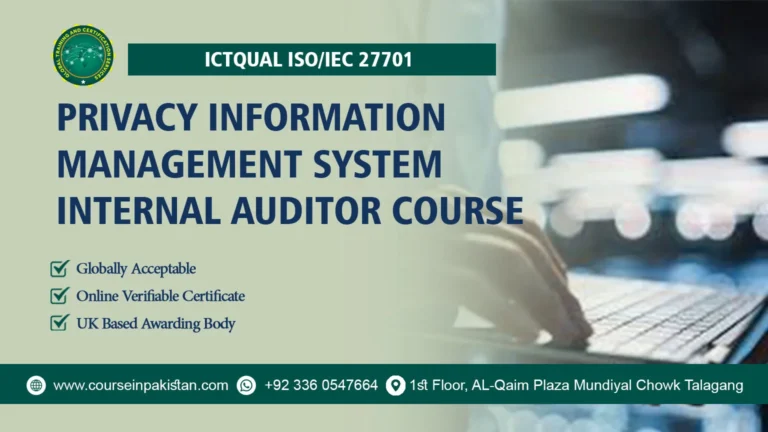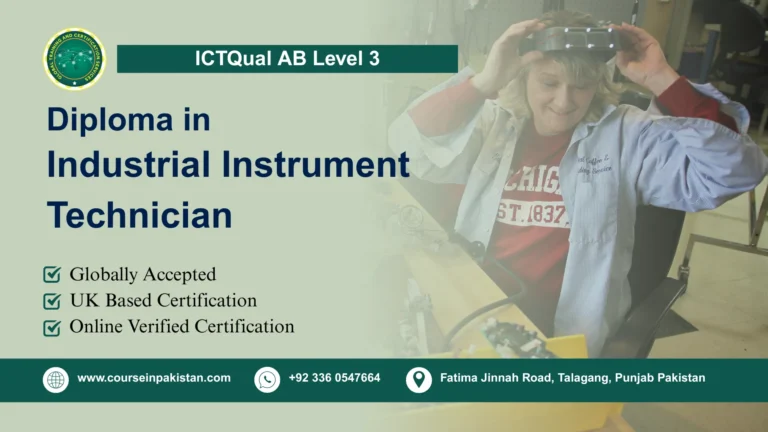
The ICTQual AB Level 6 Diploma in Industrial Instrument Technician is a high-level vocational qualification designed for professionals aiming to master advanced instrumentation and control systems in industrial environments. This program is tailored for individuals who already possess foundational knowledge and are ready to take on more complex technical challenges, leadership roles, or specialized functions within the field.
Learners will delve into sophisticated topics such as distributed control systems (DCS), supervisory control and data acquisition (SCADA), advanced PLC programming, smart instrumentation, and industrial communication protocols. The curriculum integrates theoretical depth with intensive hands-on training, enabling students to work with cutting-edge equipment and simulate real-world industrial scenarios. Emphasis is placed on system design, integration, diagnostics, and optimization to ensure learners are equipped to manage high-performance instrumentation systems.
This diploma is ideal for experienced technicians, engineering professionals, and those seeking to transition into senior roles or consultancy positions. It also serves as a gateway to further academic progression, including postgraduate studies and internationally recognized certifications. Graduates will be prepared to lead instrumentation projects, implement automation strategies, and contribute to innovation in sectors such as oil and gas, power generation, manufacturing, and chemical processing.
Course Overview
The ICTQual AB Level 6 Diploma in Industrial Instrument Technician offers a rigorous and immersive learning experience that blends advanced theory with practical application. Learners will explore modules focused on instrumentation system design, process optimization, industrial networking, safety compliance, and project management. Each module is structured to build strategic thinking, technical leadership, and problem-solving capabilities in complex industrial settings.
The course is designed to meet the evolving demands of global industries, where precision, efficiency, and innovation are critical. Through project-based learning, case studies, and real-world simulations, students will gain the confidence to manage instrumentation teams, oversee system installations, and troubleshoot high-level control systems. Upon completion, graduates will be well-positioned to pursue senior technical roles, academic advancement, or specialized certifications in industrial automation and control engineering.
Key Highlights of the Course:
- Advanced curriculum covering DCS, SCADA, and networking
- Hands-on training with smart sensors, control valves, and PLCs
- Emphasis on instrumentation design, integration, and optimization
- Real-world simulations and project-based learning modules
- Instruction from industry experts and experienced engineers
- Globally recognized qualification for senior technical roles
- Pathways to higher education and professional certifications
Course Benefits
The ICTQual AB Level 6 Diploma in Instrument Technician offers a wide range of benefits for learners seeking to elevate their careers in industrial automation and control. Below are the key advantages:
Advanced Technical Mastery
- Gain expertise in designing, integrating, and maintaining complex instrumentation systems
- Develop proficiency in advanced PLC programming, DCS configuration, and SCADA operations
- Learn to apply predictive maintenance strategies and data-driven diagnostics
Career Advancement
- Qualify for senior technician, instrumentation engineer, or automation project lead roles
- Access higher salary brackets and leadership opportunities in global industries
- Build a professional portfolio through project work and industry-relevant case studies
Industry Readiness
- Work confidently in high-performance, safety-critical environments
- Apply advanced diagnostic and optimization techniques to improve system reliability
- Understand compliance with international standards and regulatory frameworks
Professional Recognition
- Earn a prestigious diploma that validates high-level technical capabilities
- Enhance your professional profile and credibility in competitive job markets
- Gain eligibility for advanced certifications in control systems and industrial safety
Academic Progression
- Build a strong foundation for postgraduate studies in engineering or industrial systems
- Access specialized certifications in automation, control engineering, and industrial safety
- Prepare for research or teaching roles in technical education and training
Whether you’re aiming to specialize, lead, or innovate, this diploma empowers you with the advanced skills, strategic insight, and professional credentials needed to thrive in complex instrumentation roles.
Course Study Units
This qualification, the ICTQual AB Level 6 Diploma in Industrial Instrument Technician, consists of 6 mandatory units.
- Advanced Principles of Industrial Instrumentation
- Process Dynamics and Complex Variable Control
- Advanced Instrument Calibration and Quality Assurance
- Industrial Sensors, Transducers, and Final Control Elements
- Distributed Control Systems (DCS), PLCs, and Advanced Automation
- Reliability, Maintenance Strategies, and Industrial Safety Management
Learning Outcomes
The ICTQual AB Level 6 Diploma in Industrial Instrument Technician is designed to develop advanced competencies in instrumentation, automation, and industrial safety. Learners will gain in-depth technical knowledge, strategic thinking, and hands-on experience with complex systems used in high-performance industrial environments. Each unit builds on foundational skills and prepares learners for senior roles in engineering, maintenance, and process optimization.
Advanced Principles of Industrial Instrumentation
- Analyze the architecture and operation of advanced instrumentation systems.
- Evaluate the performance characteristics of smart instruments and digital transmitters.
- Apply principles of signal conditioning, filtering, and data acquisition.
- Interpret complex instrumentation schematics and system documentation.
- Understand the integration of instrumentation with control and monitoring platforms.
- Assess instrumentation design for accuracy, reliability, and scalability.
Process Dynamics and Complex Variable Control
- Understand dynamic behavior of industrial processes and control systems.
- Model and analyze time-dependent process variables and system responses.
- Apply advanced control strategies such as feedforward, cascade, and ratio control.
- Evaluate system stability, tuning parameters, and control loop performance.
- Use simulation tools to predict and optimize process behavior under varying conditions.
- Design control solutions for multi-variable and nonlinear process environments.
Advanced Instrument Calibration and Quality Assurance
- Perform precision calibration using advanced standards and automated systems.
- Implement calibration procedures for smart instruments and digital devices.
- Apply statistical methods for calibration validation and uncertainty analysis.
- Develop and maintain calibration documentation in compliance with ISO and industry standards.
- Conduct audits and quality checks to ensure instrumentation accuracy and reliability.
- Integrate calibration data into enterprise asset management and quality systems.
Industrial Sensors, Transducers, and Final Control Elements
- Evaluate the performance and selection criteria of advanced sensors and transducers.
- Understand the role of final control elements in closed-loop systems.
- Analyze actuator types, valve characteristics, and control element response.
- Integrate sensors and control elements into intelligent control architectures.
- Troubleshoot sensor and actuator faults using diagnostic tools and techniques.
- Apply predictive maintenance strategies to extend equipment life and performance.
Distributed Control Systems (DCS), PLCs, and Advanced Automation
- Design and configure distributed control systems for complex industrial processes.
- Develop advanced PLC programs using structured text, function blocks, and ladder logic.
- Interface DCS and PLCs with field devices, HMIs, and SCADA platforms.
- Implement network protocols and industrial communication standards (e.g., Modbus, Profibus, Ethernet/IP).
- Optimize automation strategies for process efficiency, scalability, and fault tolerance.
- Apply cybersecurity principles to protect industrial control systems from threats.
Reliability, Maintenance Strategies, and Industrial Safety Management
- Develop reliability-centered maintenance (RCM) plans for instrumentation systems.
- Apply root cause analysis (RCA) and failure mode and effects analysis (FMEA).
- Implement condition-based and predictive maintenance techniques using sensor data.
- Understand industrial safety regulations, risk assessment, and hazard mitigation.
- Promote a safety culture through training, audits, and continuous improvement.
- Integrate maintenance and safety data into enterprise resource planning (ERP) systems.
By mastering the learning outcomes across these six advanced units, learners will be equipped to lead instrumentation projects, optimize complex control systems, and uphold the highest standards of safety and reliability. This diploma prepares professionals for senior technical roles and opens pathways to specialized certifications and postgraduate studies in industrial automation and engineering.
Who is This Course For?
This advanced diploma is designed for individuals who are ready to take their expertise in industrial instrumentation to the next level. The ideal learner should possess the following qualities:
- Prior Technical Experience Has foundational knowledge or hands-on experience in instrumentation, automation, or electrical systems.
- Strong Analytical Skills Capable of interpreting complex data, control logic, and system behavior.
- Problem-Solving Mindset Enjoys diagnosing faults, optimizing systems, and implementing technical solutions.
- Leadership Potential Interested in managing projects, leading technical teams, or taking on senior roles.
- Commitment to Safety and Standards Values precision, safety compliance, and adherence to industry regulations.
- Interest in Innovation and Technology Curious about emerging technologies like IIoT, smart sensors, and advanced control systems.
This course is ideal for technicians, engineers, and professionals aiming to specialize or advance in industrial automation and control.
Future Progression
- Graduates of the ICTQual AB Level 6 Diploma can pursue a variety of career and professional development opportunities, including:
- Senior roles such as Instrumentation Engineer, Automation Specialist, or Control Systems Lead.
- Employment in high-tech sectors like oil and gas, power generation, pharmaceuticals, and advanced manufacturing.
- Transition into technical consultancy or project management within industrial automation.
- Eligibility for international certifications in DCS, SCADA, and industrial safety.
- Opportunities to contribute to research, innovation, or technical training in instrumentation.
Academic Pathways:
- This diploma also supports further academic advancement in engineering and technology:
- Entry into postgraduate programs such as Master’s in Industrial Automation, Engineering, or Mechatronics.
- Enrollment in specialized certification courses in cybersecurity for industrial systems, IIoT, or advanced PLC programming.
- Qualification for professional engineering licensure or chartered status in relevant jurisdictions.
- Pathway to academic research or teaching roles in technical institutes or universities.
The ICTQual AB Level 6 Diploma in Industrial Instrument Technician is a transformative program that empowers learners with advanced technical knowledge, leadership capabilities, and industry-ready skills. It prepares professionals to manage complex instrumentation systems, lead automation projects, and uphold the highest standards of safety and performance. Whether you’re aiming to specialize, innovate, or lead, this diploma opens doors to senior roles, academic progression, and global opportunities in industrial automation and control.






